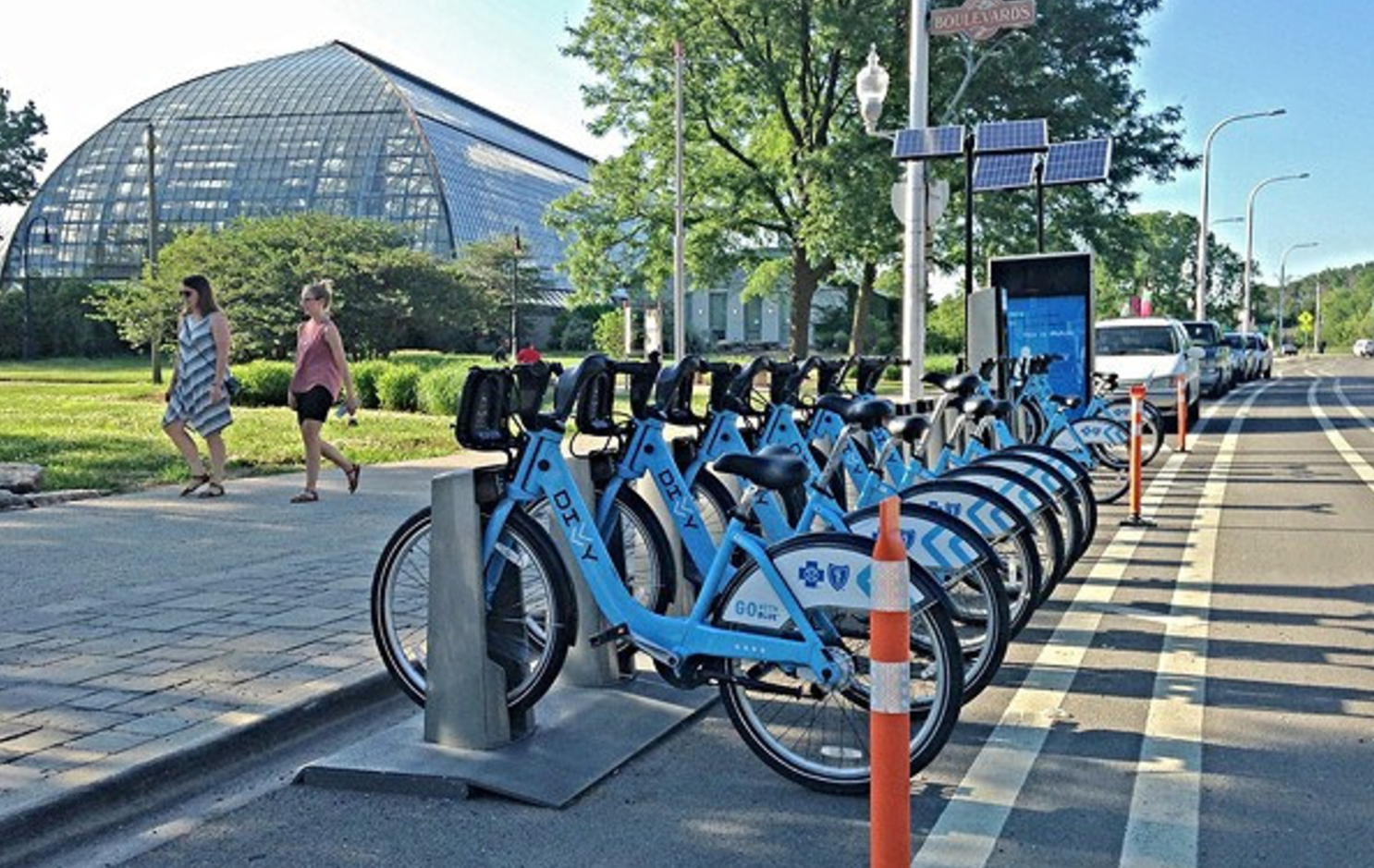Out of the blue, the Divvy bike system may be expanding citywide. The city of Chicago is expected to announce tomorrow that the existing Divvy contract will be amended to make Lyft, the parent company of Divvy concessionaire Motivate, the sponsor of the network, replacing current sponsor Blue Cross Blue Shield of Illinois. As part of the deal, which will require City Council approval, Lyft would spend $50 million on stations and bikes to bring the bike-share service to neighborhoods that currently lack docks. The city says it would also receive at least $77 million in sponsorship money from Lyft over nine years.
The deal could be good news for making the system more equitable. There are currently a higher density of stations downtown and in more affluent neighborhoods, and many outlying communities don't have docks at all.
The most obvious downside of the the deal is that, with Lyft replacing Blue Cross Blue Shield of Illinois as the sponsor, the bikes will now bear the logo of a ride-share service. Studies have shown that ride-share is increasing traffic deaths and congestion in cities, and decreasing transit ridership, so it's somewhat problematic that the thousands of Divvy bikes will double as ads for Lyft. In addition, the amendment would freeze out any other bike-share providers from operating on Chicago streets -- more on that later.
“My administration has made it a priority to create a variety of high-quality, reliable transportation options to get Chicagoans and visitors where they want to go,” Mayor Rahm Emanuel said in a statement. “While the Divvy program has expanded substantially since its launch in 2013 and helped make Chicago the best bike city in America, City Council has the opportunity to create a modernized system that creates increasing annual revenues for the city while ensuring all 50 wards have access to bike sharing.”
Under the proposed amendment, Lyft would expand the system to all 50 wards by 2021, adding 10,500 bikes and 175 stations. That would bring the total to about 16,500 bikes and 800 stations. All of the new Chicago bikes would be electric pedal-assist cycles and have hybrid locking capabilities, so they can be locked at a station or to a regular bike rack.
The city says the growth of the system would create more than 200 additional jobs with Divvy in Chicago. Lyft would also offer a job-training program for youth and ex-offenders; expand the Divvy for Everyone program for low-income Chicagoans; and pilot an adaptive bike-sharing program for people with disabilities.
Under the agreement, the city says, Chicago would maintain ownership of the current hardware. Lyft would continue to operate Divvy with equipment owned by the city as well as new equipment purchased by Lyft. The city would maintain control over "significant" fare pricing changes and any new fare products or promotions, and Lyft would continue to be accountable for meeting service quality standards.
The amendment would not extend the existing term of the Divvy contract, which has nine years remaining. Any extension beyond the contract’s remaining nine years would also require City Council approval. If the agreement is approved by the Council, Lyft would have exclusive rights to operate bike-share from the city’s public right of way, and the city would not license or permit any other bike-share operations during the term of the agreement.
Additionally, the city asserts, the amendment would restructure the financial terms of the contract to "dramatically" increase annual guaranteed revenues and reduce financial risk to the city. Lyft would pay the city an annual payment of $6 million, which would increase by four percent each year. In addition, the city would receive $1.5 million in minimum guaranteed revenue from advertising and promotions, and five percent of all rider revenue that exceeds $20 million per year. The city says that over the nine-year life of the contract, this would total a minimum of $77 million in guaranteed revenue.
The city asserts that the proposed agreement would also eliminate the city’s current financial risk for the system, since Lyft will absorb all operational, cost, and revenue risk of Divvy’s performance, and would eliminate the city’s current obligation to share in operating losses.
The city says it would continue to maintain oversight of the performance of the Divvy contract through a set of ridership and equity targets, and the city would retain its ability to assess financial penalties if Lyft does not meet these targets.
While, on the face of it, the upcoming announcement seems to be great news for Chicago, the devil's in the details. Hopefully aldermen will give this amendment much more scrutiny than they did to Chicago's much-hated parking meter deal, which was approved within a matter of days after a heavy push by then-mayor Richard M. Daley.
Update 3/13/19: Per a city official, the new contract would not prevent dockless scooter companies from operating in Chicago.
![]()
Did you appreciate this post? Consider making a donation through our PublicGood site.




